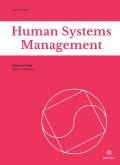Authors: Liang, Thow Yick
Article Type:
Research Article
Abstract:
In this paper, the edge of chaos is re-examined, and shifted to the third critical value. The second critical value is re-defined as the edge of emergence. This shift allows the macro-dynamic of emergence to be better comprehended. Upon crossing the edge of order (first critical value), first degree self-organization or self-transcending constructions occurs leading to intra-system emergence. Similarly, after crossing the new edge of emergence, second degree self-organization or self-transcending constructions occurs leading to inter-system emergence. In all biological systems, a complexity-intelligence linkage exists intrinsically, and this is even more so in human organizations. As human agents' self-stability
…and self-centricity possesses a mental dimension due to their intense intelligence and consciousness; complexity is in the mind of the beholder. Complexity in the human world can be relativistic. Thus, a human agent or human organization may perceive certain spaces of complexity as spaces of relativistic order – leading to the emergent of relativistic complexity. In this analysis, the relativistic complexity dynamic (encompassing order, relativistic order, and complexity) and its association with the intelligence leadership strategy will also be analyzed.
Show more
Keywords: Newtonian mindset, complexity mindset, intelligence mindset, intelligence paradigm, emergence, reductionist hypothesis, constructionist hypothesis, relativistic complexity, autopoiesis, self-organization, self-transcending constructions, stability-centric, self-centric, self-powered human agents, intrinsic individual leadership, deliberate-emergent auto-switch, edge of order, edge of emergence, edge of chaos, ‘intelligent person’, space of relativistic order, relativistic static equilibrium, intelligent organization theory
DOI: 10.3233/HSM-130781
Citation: Human Systems Management,
vol. 32, no. 1, pp. 3-15, 2013
Price: EUR 27.50





